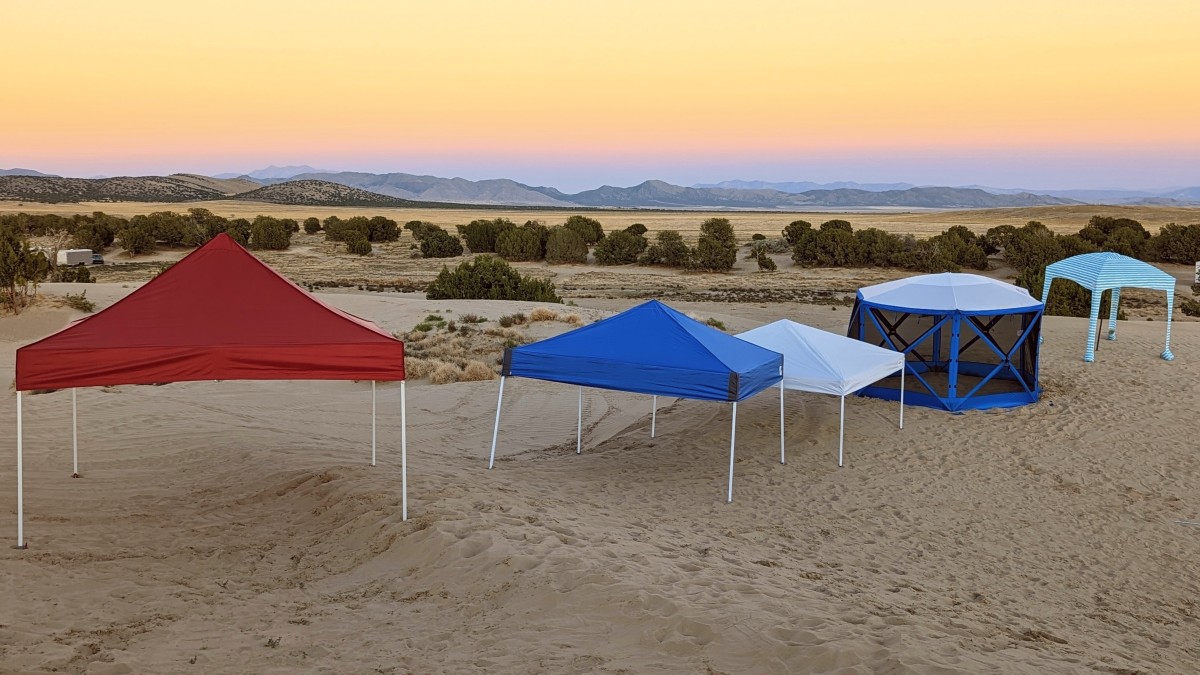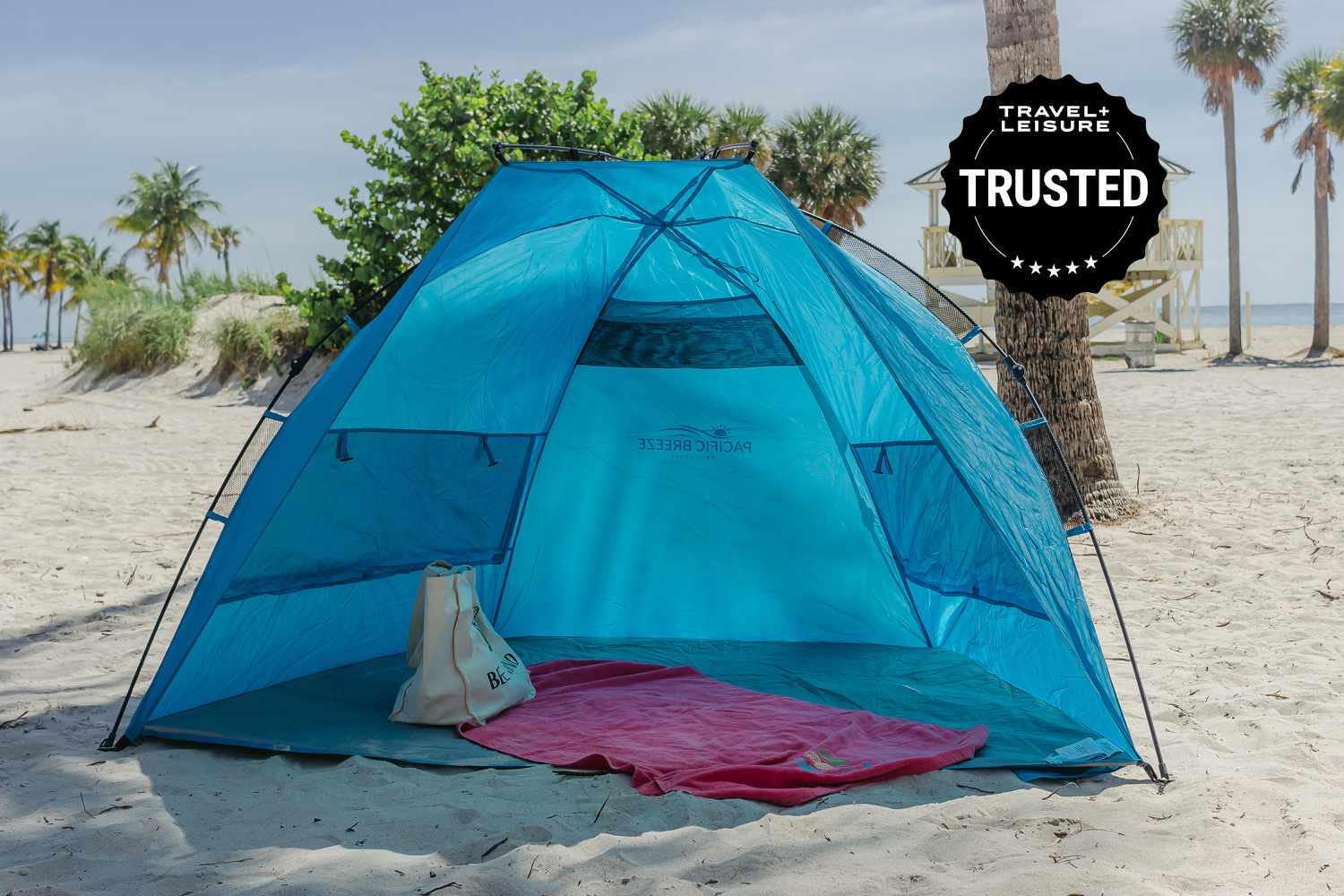Can You Put a Tent on the Beach? Yes, you can put a tent on the beach, but beach regulations vary, so always check in advance. Some beaches permit tents during the day, requiring removal by evening, while others may allow overnight camping with permits, mostly within state parks.
Additionally, it’s crucial to consider environmental and wildlife protection rules in certain areas, such as in Florida, where designated campgrounds within state parks allow beach camping. Always verify local regulations and choose a proper tent designed for beach use to ensure a pleasant experience for all.
Remember to follow any advisories and consider weather conditions when camping near the water. Happy beach camping!
1. Understanding Beach Camping Regulations
Beach camping offers a unique and exciting experience, but it’s essential to understand the regulations in place to ensure a hassle-free and enjoyable trip.
1.1 Beaches That Allow Overnight Camping
Some beaches, predominantly within state parks, permit overnight camping. However, it’s crucial to research and verify the specific beaches that allow this activity.
1.2 Permits And Restrictions
Many beaches have regulations and may require permits for overnight camping. Understanding these restrictions and acquiring necessary permits is crucial to avoid legal complications.
1.3 Sunset Tent Removal Requirements
Beaches that allow tents or shelters during the day typically require their removal before sunset. It’s important to adhere to specific sunset tent removal requirements to comply with beach regulations.

Credit: www.anker.com
2. Choosing The Right Tent For Beach Camping
When it comes to camping on the beach, one of the most crucial decisions to make is choosing the right tent. Beach camping offers a unique experience, and the type of tent you select can significantly impact your overall enjoyment and comfort. From beach-specific features to wind and sun protection considerations, here’s what you need to know about choosing the perfect tent for your beach adventure.
2.1 Beach-specific Tent Features
Beach camping requires specific features in your tent to ensure a comfortable and enjoyable experience. When selecting a tent for beach camping, consider the following essential features:
- Sand Anchoring: Look for tents with sand anchors or sand pockets to secure the tent firmly in the sandy beach ground.
- UV Protection: Choose a tent with UV-resistant materials to protect you from harmful sun rays.
- Lightweight and Compact: Consider lightweight and compact tents for easy transportation and setup on the beach.
- Open Design: Look for open-designed tents to enjoy the surrounding beach views inside the tent.
2.2 Benefits Of Using A Beach Tent
Using a tent specifically designed for beach camping offers several advantages that enhance your overall beach experience:
- Sun Protection: A beach tent provides essential shade, offering protection from the sun’s harsh rays and allowing you to relax comfortably.
- Privacy and Comfort: With a beach tent, you can create a private and comfortable space for changing, relaxing, and escaping the beach crowds.
- Wind Resistance: A well-designed beach tent provides sturdy shelter against wind, ensuring a secure and stable camping environment.
- All-Weather Use: Beach tents are versatile and can protect you from light rain or wind, allowing you to enjoy the beach regardless of the weather.
- Safe Storage: Beach tents provide secure storage for your belongings, keeping them sand-free and safeguarded from beach elements.
2.3 Considerations For Wind And Sun Protection
When setting up a tent on the beach, it’s crucial to consider wind and sun protection To guarantee the comfort and pleasure of a camping experience:
- Wind Considerations: Position your tent to maximize wind protection and use sandbags or stakes to secure it against strong coastal winds.
- Sun Protection: Use sunshades, tarps, or additional UV protection layers to create a shaded, sun-safe area around your beach tent.
- Ventilation: Ensure your chosen tent offers sufficient ventilation to promote airflow, preventing the buildup of heat inside the tent.
- Beach Umbrella Options: Consider complementing your beach tent with a large umbrella for sun protection and flexibility in creating shaded areas.
3. Anchoring Techniques For Beach Tents
When you’re planning a beach camping trip or a day out at the beach, it’s important to ensure that your tent stays securely in place, no matter the weather conditions. Beaches can be windy and have shifting sands, making it challenging to keep your tent anchored. Luckily, you can use several effective techniques to anchor your beach tent and enjoy a worry-free time by the shore.
3.1 Burying Tent Legs In Sand
If you’re looking for a simple and effective anchoring technique, burying your tent legs in the sand is a great option. Sinking the legs at least one foot deep into the sand creates a stable foundation for your tent. This method works best on beaches with soft, sandy terrain.
Here’s a step-by-step guide on how to bury your tent legs:
- Choose a flat area on the beach to set up your tent.
- Position your tent and extend its legs.
- Using your hands or a shovel, dig holes in the sand where you want to place the tent legs.
- Lower the legs into the holes and pack the sand tightly around them to ensure stability.
- Repeat the process for all the tent legs, ensuring they are securely buried in the sand.
3.2 Using Pvc Pipes For Added Stability
In addition to burying your tent legs, using PVC pipes can provide additional stability to your beach tent, especially if you’re camping on a windy beach. PVC pipes act as anchors, preventing your tent from being lifted or blown away by strong gusts of wind.
Follow these steps to use PVC pipes for added stability:
- Before your beach trip, obtain PVC pipes that are at least four feet long and have a diameter suitable for your tent legs.
- At the beach, bury the PVC pipes vertically in the sand, parallel to each tent leg.
- Slide the tent legs into the PVC pipes, creating a secure connection between the tent and the pipes.
- Pack sand tightly around the PVC pipes to hold them firmly in place to enhance stability.
3.3 Tips For Securing Tents On Rocky Beaches
Rocky beaches pose their own challenges when it comes to securing your tent. Without the option to bury tent legs in the sand, you must find alternative ways to keep your tent stable.
Here are some tips for securing tents on rocky beaches:
- Use heavy-duty stakes or anchors specifically designed for rocky terrains.
- Choose a tent with sturdy support poles and a robust frame to withstand the rugged conditions.
- Utilize guy lines and tensioners to secure your tent to nearby sturdy objects like rocks or trees.
- Consider using heavy rocks or sandbags as additional weights to anchor your tent.
Following these tips, you can ensure your tent remains secure and stable, even on rocky beaches.
Remember, proper tent anchoring is key to a successful beach camping experience. Whether you’re burying your tent legs in the sand, using PVC pipes, or securing your tent on a rocky beach, these techniques will help you enjoy a stress-free time by the seaside.

Credit: www.outdoorgearlab.com
4. Beach Camping Destinations And Rules
Setting up a tent on the beach is permitted in some areas, but it is important to check local regulations and obtain any necessary permits. While many beaches allow tents during the day, overnight camping may only be allowed in certain designated areas.
Be sure to follow rules to protect the environment and wildlife.
4.1 Camping On Beaches In Florida
Florida is famous for its beautiful coastline. Offers some fantastic beach camping opportunities. However, it’s important to note that camping directly on the beach is generally prohibited in most locations to preserve the environment and protect wildlife. Thankfully, there are designated areas where you can sleep in your tent right on the beach, usually found within state parks and campgrounds.
4.2 Designated Beach Camping Areas In Other States
While Florida has its fair share of beach camping spots, other states also offer designated areas where you can set up your tent and enjoy the seaside experience. Each state may have its own specific rules and regulations, so it’s crucial to check local guidelines before making any plans. Some popular beach camping destinations in other states include California, Oregon, Washington, and the Outer Banks in North Carolina.
4.3 Global Beach Camping Opportunities
Beach camping is not limited to the United States alone. Around the world, there are numerous coastal destinations where you can pitch your tent and fall asleep to the soothing sounds of crashing waves. Popular global beach camping opportunities include tropical destinations like Thailand, the Philippines, and Australia, where beautiful beaches are so wide that they are impossible to see. Remember to research local regulations and obtain any necessary permits, as each country and location may have its rules governing beach camping.
Overall, beach camping presents a unique and adventurous way to experience the natural beauty of coastal regions. Whether you’re exploring the shores of Florida, other states in the US, or even international beach destinations, camping on the beach can make for a truly unforgettable experience. Remember to follow the rules and regulations, the specific location you choose, respect the environment and leave no trace behind. So pack your tent, grab sunscreen, and prepare for a beach camping adventure.
5. Tips And Precautions For Beach Camping
Camping on the beach is a unique and exciting way to enjoy the great outdoors. However, extra precautions and preparations are required to ensure a safe and enjoyable experience.
5.1 Checking Local Advisories And Weather Conditions
Before setting up your tent on the beach, checking local advisories and weather conditions is crucial. You will be able to keep up with the news by taking this step on any beach camping restrictions, permits required, or closures due to environmental factors.
5.2 Wildlife Safety And Food Storage
One important aspect of beach camping is ensuring wildlife safety and proper food storage. When setting up your campsite, storing your food securely is essential to prevent attracting unwanted visitors like raccoons or seagulls. Using proper food storage containers or hanging food bags in a nearby tree can significantly reduce the risk of encountering wildlife.
Moreover, remember to keep a safe distance from any wildlife you may encounter on the beach. Avoid feeding or approaching animals, as this can disrupt their natural behavior and even harm them and you. Enjoy observing them from a respectful distance to minimize any potential conflicts.
5.3 Best Practices For Leaving No Trace
Beach camping provides an incredible opportunity to enjoy nature’s beauty, but it also comes with the responsibility to leave no trace. By following these best practices, you can minimize your environmental impact and contribute to the conservation of beaches for future generations.
- Avoid damaging or removing natural elements from the beach, such as rocks, shells, or plants.
- Use biodegradable or eco-friendly toiletries to minimize pollution of the water and surrounding ecosystem.
- Respect any posted rules or regulations and stay on designated trails or camping areas.
By following these tips and precautions, you can have a safe and enjoyable beach camping experience while minimizing your impact on the environment. So go ahead and plan your beach camping trip, immerse yourself in the tranquil beauty of the shoreline, and create unforgettable memories.

Credit: www.pelican.com
Frequently Asked Questions On Can You Put A Tent On The Beach
Is It OK to Take A Tent To The Beach?
Yes, it’s okay to take a tent to the beach. However, some beaches may have specific rules or restrictions.
Can You Put A Pop-Up Tent On The Beach?
You can put a pop-up tent on the beach for sun and wind protection. Just ensure it’s permitted, as some beaches have restrictions. Additionally, consider anchoring the tent securely in the sand for stability.
Can You Put Up A Tent On the Sand?
You can put a tent on the sand if it is permissible in that area. Many beaches allow tents for daytime use. Some beaches may even allow overnight camping with proper permits. Check local regulations and advisories before setting up a tent.
Can You Bring A Tent To The Beach In Florida?
Yes, you can bring a tent to the beach in Florida if permitted in designated areas such as state parks and campgrounds. Following specific rules and regulations is important to protect the environment and wildlife.
Always check for restrictions before planning your camping trip.
Conclusion
It is possible to put a tent on the beach, but it depends on the specific rules and regulations of the area. While some beaches allow tents or other shelters during the day, they may require you to remove them before sunset.
Overnight camping on beaches is only allowed in certain designated areas, usually within state parks, and may require permits. It’s important to check the rules and The rules of the specific beach you are going to visit to ensure compliance and protect the environment and wildlife.

